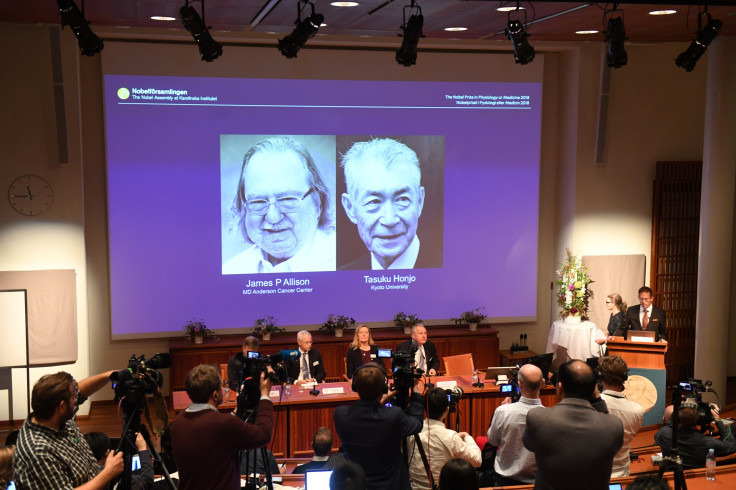Who Are James Allison, Tasuku Honjo? Cancer Immunotherapy Researchers Win Nobel Prize

The Nobel Assembly at Karolinska Institutet, Sweden, decided to award the 2018 Nobel Prize in Physiology or Medicine jointly to American James P. Allison and Japanese Tasuku Honjo for their “discovery of cancer therapy by inhibition of negative immune regulation.”
The two independent researches conducted by the laureates looked into releasing the breaks on the immune system and taking advantage of the human system’s natural ability to kill cancer cells in order to tackle the disease. The discoveries made by the two were considered to be a landmark in the fight against the disease.
Cancer involves a group of diseases that involve abnormal cell growth with the potential to destroy body tissue and invade other parts of the body.
Allison studied and realized the potential of a protein, which acted as a brake on the immune system, and could be manipulated to allow immune cells to attack tumors. He developed the concept into a new approach for treating patients.
Honjo, on the other hand, discovered a protein in immune cells that act as a brake as well, but with a different mechanism of action. Therapies based on his discovery were strikingly effective in cancer treatment, a press release from the Nobel Foundation said.
According to the website of MD Anderson Cancer Center, Allison, 70, is the Chair of the Department of Immunology, the Vivian L. Smith Distinguished Chair in Immunology, Director of the Parker Institute for Cancer Research, and the Executive Director of the Immunotherapy Platform at the institute.
He has over 40 years of teaching experience and has over 50 awards and honors to his name for his research work, the latest of them being the Nobel Prize he shares with Honjo. He received his Bachelor in Microbiology 1969 from The University of Texas at Austin and completed his Ph.D. in Biological Sciences from the same varsity in 1973. He was a Postdoctoral Fellow in the Department of Molecular Immunology, Scripps Clinic and Research Foundation, La Jolla, California, for three years till 1977, when he began his teaching carrier.
According to MD Anderson Cancer Center website, his most notable discoveries include studying the regulation of T cell responses and developing strategies for cancer immunotherapy. His study led to the development of ipilimumab, the first immune checkpoint blockade therapy approved by the United States Food and Drug Administration.
Just in! Nobel Laureate Tasuku Honjo, surrounded by his team at Kyoto University, immediately after hearing the news that he had been awarded the 2018 #NobelPrize in Physiology or Medicine. pic.twitter.com/8TdlnXiSLe
— The Nobel Prize (@NobelPrize) October 1, 2018
The Kyoto University website describes Tasuku Honjo as “quiet man.” The 76-year-old is a graduate of the Graduate School of Medicine, Kyoto University. He then went on to complete his Ph.D. in Medical Chemistry (1975) and M.D. from the Faculty of medicine (1966) from the same university. He’s currently a professor, Graduate School of Medicine, Kyoto University, where he began teaching in 1984.
According to the website, Honjo finds immunology fascinating and began his studies in the field purely due to a desire to unravel its mysteries.
"I may become a professional golfer," he said in reply to what he wanted to do after he completes his current research.
"We can cure cancer with it" - Klas Kärre, member of the Nobel Committee, on the life-changing possibilities of this year's #NobelPrize awarded discovery. pic.twitter.com/ar4UyhuQ7h
— The Nobel Prize (@NobelPrize) October 1, 2018
The findings by the two researchers gave boost to research against fighting cancer. Until their discoveries, clinical development into the subject was modest.
“‘Immune checkpoint therapy’ has revolutionized cancer treatment and has fundamentally changed the way we view how cancer can be managed,” a tweet from the official Twitter account of the Nobel Prize said.
© Copyright IBTimes 2025. All rights reserved.





















